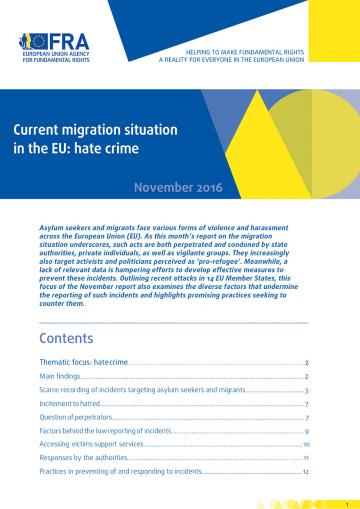Meanwhile, a lack of relevant data is hampering efforts to develop effective measures to prevent these incidents. Outlining recent attacks in 14 Member States, this focus of the November report also examines the diverse factors that undermine the reporting of such incidents and highlights promising practices seeking to counter them.
FRA data – as of November 2016 – indicate that violence, harassment, threats and xenophobic speech targeting asylum seekers and migrants remain pervasive and grave across the European Union, whether committed by state authorities, private companies or individuals, or vigilante groups.
Main findings
- Violent acts targeting asylum seekers, migrants and persons with ethnic minority backgrounds – including killings, threats and intimidation – are committed in a number of Member States.
- Evidence indicates that racist and xenophobic violence is committed by a variety of offenders, including people stemming from the general population and members of vigilante groups.
- State authorities’ responses to hate crime against asylum seekers and migrants are perceived as weak by civil society in many Member States. In some cases, political actors welcomed the activities of vigilante groups.
- Most Member States do not collect or publish statistical data on incidents and hate crimes against asylum seekers and migrants.
- Where such data do exist – for example, collected by civil society – they indicate that such incidents are pervasive and grave.
- In addition to asylum seekers and migrants, other groups – including Muslims, especially women and persons with ethnic backgrounds – are specifically targeted, as are human rights advocates, ‘pro-refugee’ politicians and journalists reporting on the issue.
- A number of factors impede the reporting of hate crimes against asylum seekers and migrants to authorities or other organisations. Low reporting renders the issue invisible.
- There is evidence of growing hate speech targeting asylum seekers and migrants on the internet, with investigation remaining difficult.
- Victim support services tailored to the needs of asylum seekers and migrants are limited in the Member States. There is a perception among practitioners that asylum seekers and migrants have limited access to victim support services.
